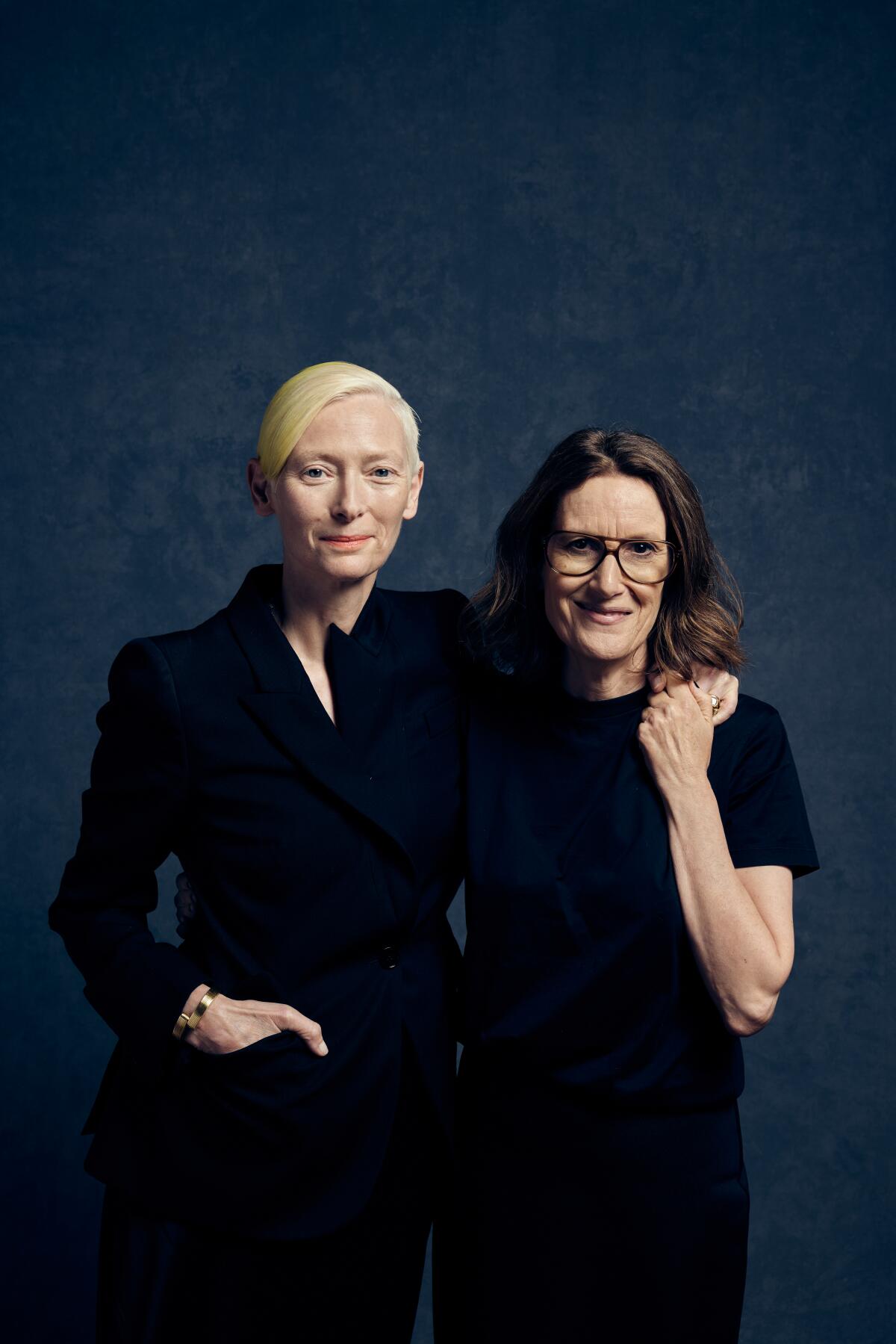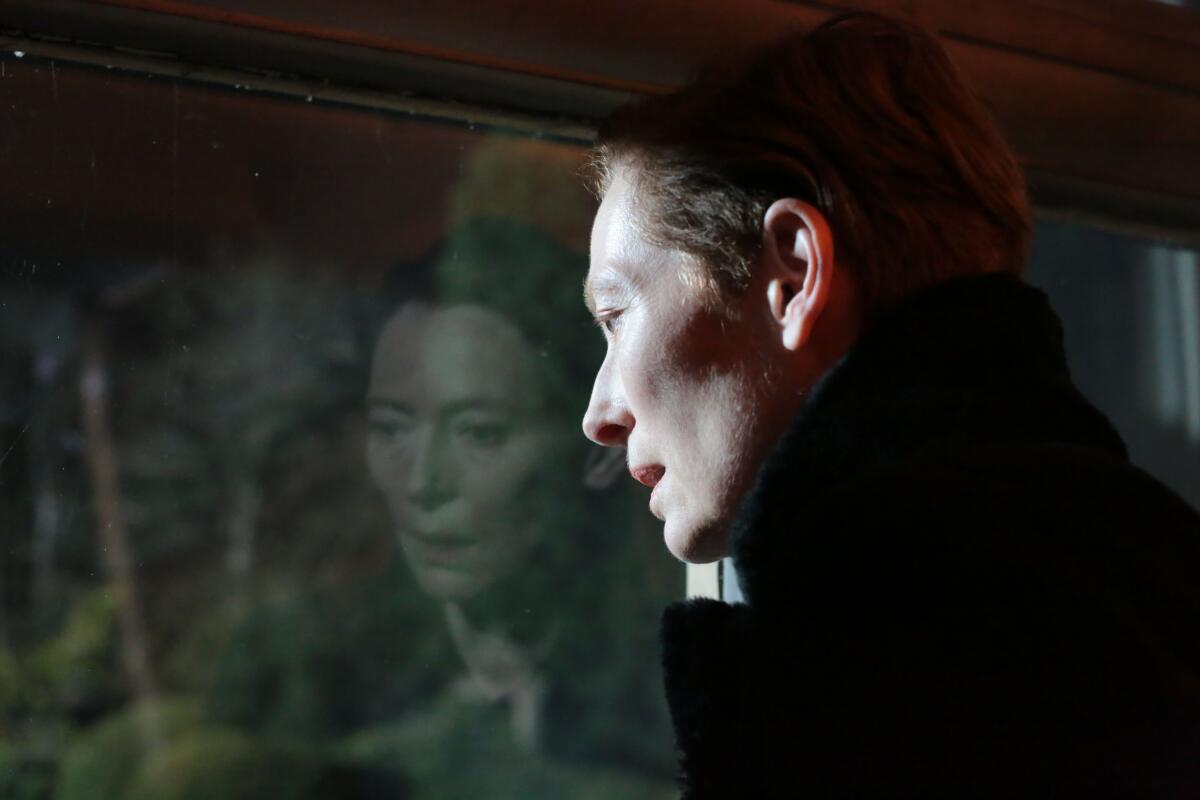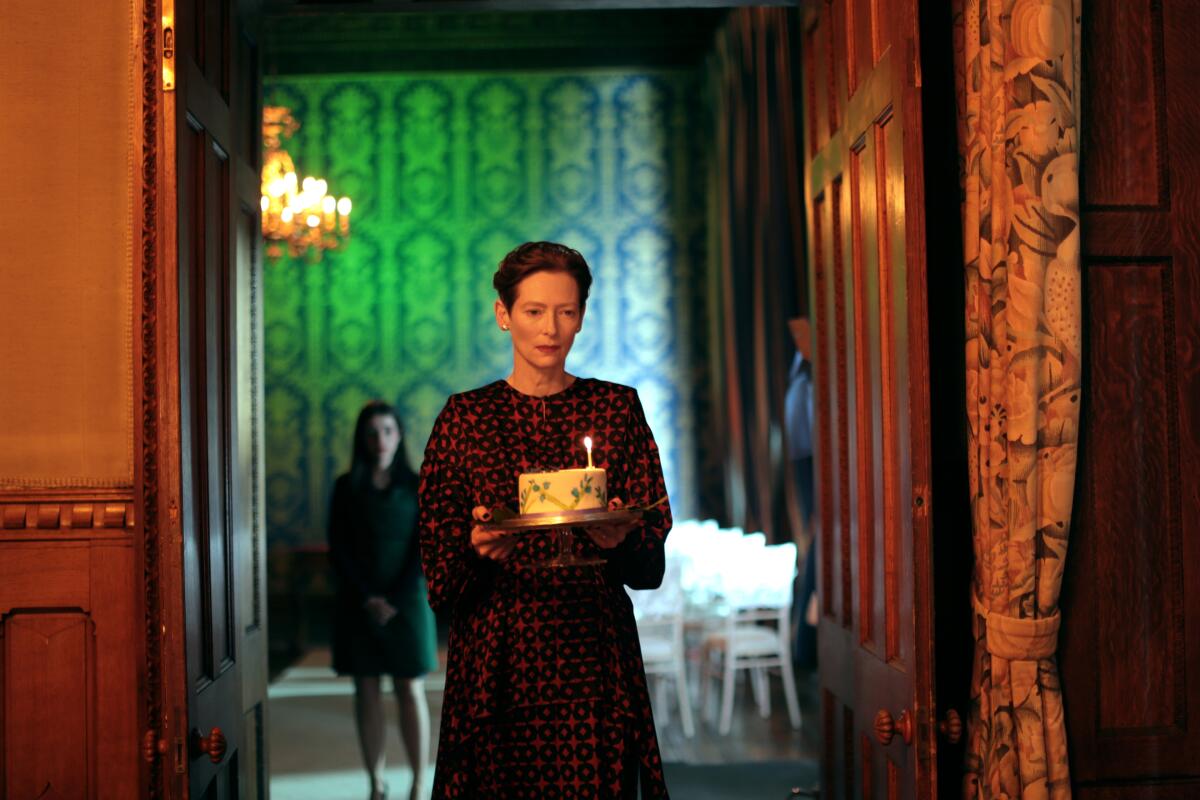Tilda Swinton and Joanna Hogg ask, Where does the mother end and I begin?

- Share via
Joanna Hogg has a tough time with horror movies. “They scare me so easily,” she confesses. “‘The Exorcist’ is one of the most brilliant horror films, and I’m barely able to watch that. I feel almost that it’s going to cast a spell on me by watching it.”
And yet, on its surface, the writer-director’s latest stunner might seem to have the trappings of that nightmare-inducing genre, telling the story of a middle-aged filmmaker and her elderly mother on a vacation at an isolated, nearly empty Welsh hotel, thick fog and gloomy unease enveloping the posh property. But “The Eternal Daughter” is, more accurately, a mournful gothic ghost story — and also an unlikely continuation of “The Souvenir” and “The Souvenir Part II,” Hogg’s recent semi-autobiographical period pieces chronicling Julie, an unconfident young artist finding her voice.
Set several years later, the new movie stars Tilda Swinton as both Julie — a role which originated with her own daughter, Honor Swinton Byrne — and Julie’s mother Rosalind, the character Swinton portrayed in the first two installments. The hotel seems haunted — an ephemeral visage sometimes appears in a window — and Julie is similarly possessed by the mother she’s spent her life trying to please. There are no jump scares in “The Eternal Daughter,” but its exquisite eeriness nonetheless leaves you shaken.
Hogg couldn’t have asked for a better locale for her psychological drama, choosing Soughton Hall, an immaculately weathered country house built in 1714 in Flintshire, Wales, which exudes a majestic creepiness. But to the surprise of her star, Hogg insisted on residing in Soughton during the shoot.
“You were very spooked, but you were determined to stay there against all the odds,” Swinton marvels to Hogg. “You wanted to be thrilled, I think.” Hogg, who met Swinton when they were kids in boarding school — casting the actress in Hogg’s first short, 1986’s “Caprice” — ponders her longtime friend’s observation. “I did want to see something,” Hogg admits, “but the most I saw was a shadow under a door when [my bedroom] was empty.” She laughs. “I slept with the light on from that point on.”
Cate Blanchett (“Tár”), Colin Farrell (“After Yang,” “The Banshees of Inisherin”), Danielle Deadwyler (“Till”) and Mia Goth (“Pearl”) are among our critic’s choices for the best film actors of the year.
The filmmaker and actress are speaking over video — Hogg in London, Swinton from Scotland — with an almost sisterly rapport as they articulate their ambitions for a movie that’s tonally different than the previous “Souvenir” chapters, which were coming-of-age romantic dramas that placed the tender, complicated relationship between insecure Julie and supportive Rosalind in the background. But with “The Eternal Daughter,” that mother-daughter dynamic takes center stage, and while watching Swinton’s delicate dual performance, it’s impossible not to think of her connection to her own daughter, who first brought Julie to life. But Swinton insists the filmmaker character is someone all three women have an affinity for.

“Julie is not exactly like Joanna, she’s not exactly like Honor, and she’s not exactly like me — she’s like a friend of ours,” Swinton says. “We came to know her during the two ‘Souvenirs,’ and now we’re meeting her again. Of course, that person is informed by Honor’s performance in the ‘Souvenir’ films. But beyond that, she’s like a song — she’s like a melody that we know.”
As is Hogg’s filming preference. The film didn’t have a traditional script — instead, there was an extended treatment. Swinton improvised her lines as both Julie and Rosalind, with cinematographer Ed Rutherford filming one performance and then the actor switching roles to shoot the other side of the conversation. The strategy allowed “The Eternal Daughter” to sidestep a problem that bedevils stories depicting generations of a family, which is that the actors rarely look related. “The Souvenir” presented a real-life mother and daughter, but “The Eternal Daughter” goes even further, utilizing the same actor for both roles to ask, as Swinton puts it, “Where does one’s mother end and I begin?” Chiming in, Hogg compliments her leading lady: “You’re channeling your mother, my mother, ourselves. There are so many shades to it.”
Much of “The Eternal Daughter” concerns Julie’s anxiety over telling her mom that she wants to make a movie about her, occasionally surreptitiously turning on a digital recorder as Rosalind reflects on her life. That act of capturing a mother’s memories is meaningful to Hogg, who was very close to her own mom, who died during the editing of “The Eternal Daughter.” “I made the film already grieving my mother in a sense because she was elderly, in her early 90s,” Hogg says. “I’d been dreading the moment [of her death] for years and years. And making the film was, in a way, a form of catharsis before the event, which seems very strange. It seems sort of morbid.”

As a result, when “The Eternal Daughter” premiered in Venice, Hogg wasn’t just showing a film — she was, for the first time, having to discuss losing her mom, which could reduce her to tears in interviews. Asked if it’s gotten easier over time, Hogg replies, “I’m able to deal with it better than I thought. But grief is such a strange, serpentine thing. There have been moments standing on stage where I have been overcome with emotion and sudden realization that my mother will never see the film, because she had been looking forward to it. I find that the more time that passes since she died, the more vivid she is becoming to me and the more I miss her. There’s a comfort in her becoming more vivid, because I don’t think I’ll ever forget her voice and her presence. But, yes, I’m more aware of that vacuum.”
The death of a mother is something she shares with Swinton, who lost hers about a decade earlier. Adding to the film’s poignancy, Swinton’s own spaniel Louis “plays” Julie’s loyal dog — but Louis’ mother is no longer with us. “Rosie, unfortunately, left us a month ago,” Swinton says wistfully, her dogs, including Louis, relaxing around her on the sofa. “Which means that not only Joanna and I, but also my co-star has also just lost his mother, so that’s a sad thing.”
Quite movingly, “The Eternal Daughter” grapples with the anticipatory terror of saying goodbye to a parent — that strange sensation of girding oneself for anguish before that person is even gone. Seeking inspiration, Hogg looked at classic horror films such as “The Innocents” and “Night of the Demon.” But the real insight was the reading she did. “M.R. James’ stories, Edith Wharton’s ghost stories, Kipling’s ghost stories,” Hogg cites, singling out Kipling’s “They” in particular as “a revelation, because it made me realize that a ghost story could also be very moving and go to emotional territory and not just be something spooky and supernatural.”
Hogg achieved a similar alchemy with “The Eternal Daughter” — and she may have also opened the door for more “Souvenir” installments.
“I think Joanna and I both feel that we’re still interested in that territory,” Swinton says, excitedly. “We’ve gone in and had a bit of a rummage in this question of difference and similarity between mother and daughter. But we’ve only scratched the surface, I would suggest.”
More to Read
Sign up for The Envelope
Get exclusive awards season news, in-depth interviews and columnist Glenn Whipp’s must-read analysis straight to your inbox.
You may occasionally receive promotional content from the Los Angeles Times.







